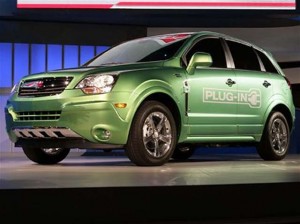
With Saturn and Pontiac to be closed down, where will current owners go when it's time to trade in? Not back to GM, says a new study.
As part of its bankruptcy reorganization, General Motors will cut in half the number of brands it operates in North America. While it is selling off Hummer and Saab, it will close Pontiac and, it turns out, the Saturn division, as well, now that Roger Penske’s plan to buy the division has collapsed.
Prior to going into Chapter 11 court protection, GM held a bit more than 20% of the American auto market – and it actual nipped 21%, despite a sharp sales decline, in September. The automaker acknowledges it will lose some share, but is hoping to retain about 18%, even after abandoning the four brands. Not likely, suggests a new study by Experian Automotive, which indicates the struggling domestic maker will lose many current Saturn and Pontiac customers whom it had hoped to shift to other GM brands.
Between them, Saturn and Pontiac collectively accounted for about one in seven cars, trucks and crossovers sold by General Motors in the U.S., according to Experian data, the former brand making up 5% of the GM total, the latter 9%. Pontiac alone was nearly as large, even after years of decline, as Mercedes-Benz, Mazda or Subaru. Saturn was bigger than Mitsubishi, Suzuki and Land Rover.
When news began to circulate last year that GM would get rid of the two brands, Experian measured a notable decline in customer loyalty among Saturn owners, though Pontiac loyalty actually rose slightly.
But the research reveals that for both brands, the majority of owners will be shopping anyone but GM, next time. Less than a quarter of Saturn owners would consider replacing their car with a Chevrolet, and they’re open to virtually none of the other brands. Pontiac owners are a bit more loyal, and a third might move to Chevy, but on the whole, more than 60% will be leaving the GM family, unless the automaker finds a way to win them back.
Based on current responses, Ford is likely to gain significantly from those GM defections – 9.5% of current Saturn owners and 8.5% of Pontiac owners said they’d consider Ford products. Toyota should also do well, gaining a thumbs-up from 11.4% of Saturn owners and 7.1% of Pontiac owners. Other brands that could benefit well at GM’s expense include Honda, Nissan, Hyundai and Dodge.
If the Experian data prove accurate, GM is likely to wind up at barely 17.5% of the U.S. market, once it cuts down to four brands. Ford would be close behind, at 17.4%, with Toyota charging up the rear, at 16.2%, the consultancy predicts.
That would set up an interesting battle for supremacy just as the U.S. market begins what is anticipated to be a slow recovery. Late last year, Toyota surpassed GM, for the first time ever, on a global scale and would love to gain number one status in the States. But Ford is equally ambitious. It posted an unexpectedly modest 5% decline in sales, last month, underscoring its steady resurgence. Ford has played number two to GM for three quarters of a century in the domestic market and could see an opportunity to avenge itself.
But as Ford President Mark Fields recently pointed out, in an interview with TheDetroitBureau.com, “volatility is the new norm,” and who’ll gain share from whom, in the coming months, is anything but certain.

A look at the September data shows that GM’s four core brands — Chevy, GMC, Buick and Cadillac — accounted for 9 out of 10 of GM’s sales. Those four brands alone accounted 18.6% of the total market, in the midst of signficant shortages of several launch vehicles. So it seems a little pessimistic to think that share will drop to the level Experien predicts.
Tom is correct.
Experian Automotive’s analysis was based on registrations during the first six months of the year. Based on the six-month trend, Experian estimated GM’s share with four core brands at 17.5%.
The most recent month’s estimate is 18.6%.